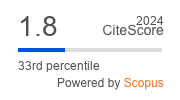Pengembangan Smart Home Dengan Microcontrollers ESP32 Dan MC-38 Door Magnetic Switch Sensor Berbasis Internet of Things (IoT) Untuk Meningkatkan Deteksi Dini Keamanan Perumahan
Abstract
The objective developed from this research is to utilize Smart Home with an integrated ESP32 microcontroller with a camera and MC-38 door magnetic switch sensor based on the Internet of Things (IoT) as a research base to detect the security of arumsari earth housing in Cirebon District when left by its inhabitants. ESP32 microcontroller which can be programmed via arduino IDE, then functioned to respond to the integrated camera so that it can transmit images when the MC-38 sensor door magnetic switch sensor is active. Technically the combination of the ESP32 microcontroller and MC-38 door magnetic switch sensor, which was developed as a prototype in this study is called the arumsari housing early detection system. The mechanism of the arumsari housing early detection system is when a house door or window is successfully forcibly broken without going through the system mechanism, then automatically an image or can also be developed into a video from a camera mounted on an ESP32 microcontroller will send the image through a web framework or smartphone as a form early warning of security to housing owners. The results obtained from this study are at the angle of normally open MC-38 door magnetic switch sensor of 60 - 1800, will work sending an image signal which means there is an indication of a burglar or unknown person entering the house. Whereas at the normally closed angle MC-38 door magnetic switch sensor is 00-50, it will not work sending an image signal which means the house is safe.
Downloads
References
L. M. Fernández-Ahumada, J. Ramírez-Faz, M. Torres-Romero, dan R. López-Luque, “Proposal for the design of monitoring and operating irrigation networks based on IoT, cloud computing and free hardware technologies,” J. Sensors, vol. 19, no. 10, 2019.
M. Suárez-Albela, P. Fraga-Lamas, L. Castedo, dan T. M. Fernández-Caramés, “Clock frequency impact on the performance of high-security cryptographic cipher suites for energy-efficient resource-constrained IoT devices,” J. Sensors, vol. 19, no. 1, 2019.
A. Iqbal dan M. T. Iqbal, “Low-cost and secure communication system for SCADA system of remote microgrids,” J. Electr. Comput. Eng., vol. 2019, hal. 1–13, 2019.
M. Tastan dan H. Gökozan, “Real-Time Monitoring of Indoor Air Quality with Internet of Things-Based E-Nose,” J. Appl. Sci., vol. 9, hal. 1–13, 2019.
W.-T. Sung, S.-J. Hsiao, dan J.-A. Shih, “Construction of Indoor Thermal Comfort Environmental Monitoring System Based on the IoT Architecture,” J. Sensors, vol. 2019, hal. 165–168, 2019.
L. O. Aghenta dan M. T. Iqbal, “Low-Cost, Open Source IoT-Based SCADA System Design Using Thinger.IO and ESP32 Thing,” J. Electron., vol. 8, no. 8, hal. 822, 2019.
D. Sasmoko dan D. Bachtiar, “Intelligent Baby Box Based on IoT to Observe Room Temperature and Baby Crying,” Lontar Komput. J. Ilm. Teknol. Inf., vol. 9, no. 3, hal. 114, 2018.
M. Gaudenzi Asinelli, M. Serra Serra, J. Molera Marimòn, dan J. Serra Espaulella, “The smARTS_Museum_V1: An open hardware device for remote monitoring of Cultural Heritage indoor environments,” J. HardwareX, vol. 4, hal. 1–18, 2018.
T. Kodera, “Adaptive antenna system by ESP32-PICO-D4 and its application to web radio system,” J. HardwareX, vol. 3, no. December 2017, hal. 91–99, 2018.
Y. A. Adnantha dan W. A. Kusuma, “Implementasi Wireless Sensor Network Untuk Otomatisasi Suhu Ruang Dan Kelembaban Tanah Pada Greenhouse Berbasis Web Server,” J. Online Inform., vol. 3, no. 1, hal. 14, 2018.
F. Z. Rachman, “Sistem Pemantau Gas di Tempat Pembuangan Sampah Akhir Berbasis Internet of Things,” J. Teknol. dan Sist. Komput., vol. 6, no. 3, hal. 100, 2018.
Q. Aini, U. Rahardja, H. Madiistriyatno, dan A. Fuad, “Rancang Bangun Alat Monitoring Pergerakan Objek pada Ruangan Menggunakan Modul RCWL 0516,” J. Tek. Elektro, vol. 10, no. 1, hal. 41–46, 2018.
J. Waworundeng, L. Doni, dan C. Alan, “Implementasi Sensor PIR sebagai Pendeteksi Gerakan untuk Sistem Keamanan Rumah menggunakan Platform IoT Implementation of PIR Sensor as Motion Detector for Home Security System using IoT Platform,” Cogiti Smart Joournal, vol. 3, hal. 12, 2017.
T. Erlina, “Sistem Monitoring Suhu, Kelembaban Dan Gas Amonia Pada Kandang Sapi Perah Berbasis Teknologi Internet of Things (Iot),” J. Inf. Technol. Comput. Eng., vol. 1, no. 01, hal. 1–7, 2017.
H. S. Nida, “Prototype Sistem Multi-Telemetri Wireless untuk Mengukur Suhu Udara Berbasis Mikrokontroler ESP8266 pada Greenhouse,” Kinetik, vol. 2, no. 3, hal. 217–226, 2017.
P. Prijana dan A. S. Rohman, “Studi eksperimen mengenai metode baca good reading,” Lentera Pustaka, vol. 2, no. 2, hal. 71–81, 2016.
E. Systems, “ESP32 Series Datasheet,” Espressif Systems, Espressif Systems, hal. 1–61, 2019.
S. Mariko dan A. Andri, “Perancangan Software Aplikasi Berbasis Android untuk Menghitung Variabel Fisika Listrik dan Magnet,” Jupiter (Jurnal Pendidik. Tek. Elektro), vol. 3, no. 1, hal. 17, 2018.
Copyright (c) 2019 Jurnal RESTI (Rekayasa Sistem dan Teknologi Informasi)

This work is licensed under a Creative Commons Attribution 4.0 International License.
Copyright in each article belongs to the author
- The author acknowledges that the RESTI Journal (System Engineering and Information Technology) is the first publisher to publish with a license Creative Commons Attribution 4.0 International License.
- Authors can enter writing separately, arrange the non-exclusive distribution of manuscripts that have been published in this journal into other versions (eg sent to the author's institutional repository, publication in a book, etc.), by acknowledging that the manuscript has been published for the first time in the RESTI (Rekayasa Sistem dan Teknologi Informasi) journal ;








